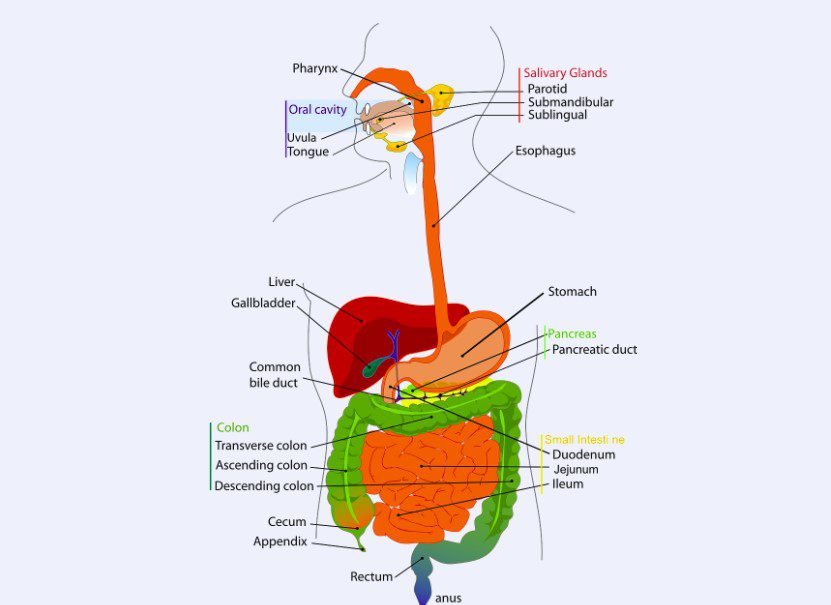Your child’s gut is far more complex than simply processing food. It houses millions of nerve cells, often referred to as the “second brain.” It is also home to trillions of microorganisms, collectively known as the gut microbiome. This intricate network communicates directly with the brain, to influence mood, behavior, and your child’s overall health and well-being.
The gut or gastrointestinal tract refers to the entire digestive tract responsible for the overall process of digestion, nutrient absorption, and waste elimination. These are designed to maintain and optimize your child’s gut health as a whole.
It is important to realize that the gastrointestinal tract can provide significant insights in your child’s health, including their state of immunity.
Poor gut health can lead to a variety of health issues. These include digestive problems, autoimmune disorders, and mental problems. In extreme case it can lead to chronic diseases like diabetes and heart disease.
Therefore, taking care of your child’s gut through a healthy diet, regular exercise, and other lifestyle factors is very crucial.
The Gut Microbiome
One of the most useful factors in determining your child’s health is the gut microbiome.

The gut microbiome refers to the complex community of microorganisms, such as bacteria, viruses, fungi, and protozoa, that live in the digestive tract. The gut microbiome plays a critical role in maintaining overall health.
These microorganisms are responsible for breaking down food and absorbing nutrients. It also helps to regulate the immune system.
The composition of the gut microbiome is influenced by a variety of factors, including genetics, diet, medications, and environmental exposures. An imbalance in the gut microbiome, known as dysbiosis, has been linked to a range of health conditions.
They include inflammatory bowel disease (IBD), irritable bowel syndrome (IBS) and obesity. An imbalance can even lead to mental health disorders such as depression and anxiety.
Therefore, it is essential to pay attention to your child’s stomach and take steps to ensure the gut microbiome is healthy.
Gut Health and Neurodevelopmental Disorders
The intricate relationship between the gut and the brain has become a focal point in understanding neurodevelopmental disorders. Conditions such as autism spectrum disorder (ASD) and attention deficit hyperactivity disorder (ADHD) have been linked to imbalances in the gut microbiome.
Research suggests that gut bacteria may influence brain development, neurotransmitter production, and inflammation, all of which play a role in these conditions.
Hsiao, E. Y., McBride, S. W., Hsien, S., Sharon, G., Hyde, E. R., McCue, J. D., … & Mazmanian, S. K. (2013). Microbiota modulate behavioral and neurochemical abnormalities associated with autism spectrum disorders. Cell, 155(7), 1451-1463.
This study is a seminal work that established a strong link between gut microbiota and autism spectrum disorder. It is a good starting point for further research on the gut-brain axis and neurodevelopmental disorders.
While more research is needed, addressing gut health is increasingly recognized as a potential avenue for improving symptoms and overall well-being in children with neurodevelopmental disorders.
Signs Your Child’s Gut Health is not Fine
One cannot emphasize enough the importance of gut health as an indicator of overall health. The gut, also known as the gastrointestinal tract, is responsible for digestion and absorption of nutrients.

So, how do you know if your child’s stomach is healthy, or not? There are several indicators to look out for, including:
1. Irregular Bowel Movements:
Irregular bowel movements can refer to a range of changes in bowel habits. They include infrequent bowel movements, excessive bowel movements, constipation, diarrhea, and changes in the consistency or appearance of stool.
There are many potential causes of irregular bowel movements. They are include dietary factors, dehydration, lack of physical activity, medications, and hormonal imbalances. Elsewhere, there are medical conditions such as irritable bowel syndrome (IBS), inflammatory bowel disease (IBD), or thyroid disorders. Other factors include emotional or psychological complications such as stress and anxiety.
It is important to consult with a healthcare provider to determine the underlying cause and develop an appropriate treatment plan. Treatment may include dietary changes, increased physical activity, medication, or therapy. These are designed to address underlying emotional or psychological factors.
In some cases, lifestyle modifications alone may be sufficient to improve bowel habits. On the other hand, medical intervention may be necessary.
2. Bloating or Gas:
Bloating and gas are common signs your child’s gut microbiome is imbalanced. They refer to the sensation of fullness or swelling in the abdomen, often accompanied by increased passage of gas from the rectum or mouth.
Bloating and gas can be caused by a variety of factors. They are dietary factors such as eating too quickly, consuming high-fat or high-fiber foods, or consuming foods that are known to cause gas. The likely culprits include beans and cruciferous vegetables.
Other potential causes include bacterial overgrowth in the small intestine, lactose intolerance, and celiac disease. In addition is irritable bowel syndrome (IBS), or other digestive disorders.
It can also be a symptom of an underlying medical condition.
3. Poor Appetite:
A healthy gut should lead to a healthy appetite. If he is experiencing a loss of appetite, it could be a sign that your child’s gut microbiome is imbalanced.
Poor appetite can be caused by a variety of factors, both physical and emotional. Your child could also be having eating disorders such as picky eating.
Picky eating, also known as selective eating or selective food intake disorder, is a condition in which your child has a limited or restricted range of foods that he is willing to eat. This can include avoiding certain textures, colors, or tastes, or being unwilling to try new or unfamiliar foods.
Picky eating is common in the early years of life when children are learning to accept and enjoy new foods. However, it can also occur in adults and can be caused by a variety of factors, such as sensory issues, anxiety, or underlying psychological conditions.
4. Acid Reflux:
Acid reflux is a common sign of an unhealthy gut. If your child frequently experiences acid reflux after eating, it could be a sign his gut microbiome is imbalanced.
Also known as gastroesophageal reflux (GER), acid reflux is a condition in which stomach acid flows back up into the esophagus; the tube that connects the throat to the stomach. The acid usually irritates the lining of the esophagus. This can cause symptoms such as heartburn, chest pain, difficulty swallowing, and regurgitation of food or sour liquid.
Normally, a muscle called the lower esophageal sphincter (LES) closes off the opening between the esophagus and the stomach after food passes through. This is designed to prevent stomach acid from flowing back up. However, if the LES is weakened or relaxes abnormally, stomach acid can reflux into the esophagus.
Acid reflux can be a temporary or chronic condition. But it can be caused by inclusion of certain foods and drinks in the diet. Other factors include obesity, pregnancy, smoking, and medical conditions such as hiatal hernia and gastroparesis.
5. Food Intolerance:
Food intolerance is a condition in which the body has difficulty digesting certain types of food. This can lead to gastrointestinal symptoms such as bloating, gas, diarrhea, and abdominal pain. This in addition to headache, fatigue, and skin rash.
This intolerances is usually caused by a variety of factors. They are, genetic predisposition, changes in gut microbiota, and underlying medical conditions.
Food intolerances can also have an impact on gut health. If the body has difficulty digesting certain types of food, it can lead to inflammation and damage to the lining of the gut. This in turn disrupts the balance of gut microbiota and lead to further digestive issues.
Over time, this can lead to chronic inflammation and increased risk for other gastrointestinal disorders.
6. Frequent Illnesses:
Frequent illnesses in children might be more than just a nuisance; they could be a sign of underlying gut health issues.
The gut, often referred to as the body’s second brain, plays a crucial role in immunity. A healthy gut microbiome, teeming with beneficial bacteria, acts as a formidable defense against pathogens. When this delicate balance is disrupted, children become more susceptible to infections, colds, and digestive problems.
Understanding the connection between frequent illnesses and gut health is the first step towards supporting your child’s overall well-being.
What to do to Curb Your Child’s Gut Health Issues

If your child is experiencing any of the symptoms mentioned above, it is important to take steps to improve his gut health. Here are some tips to get started:
1. Promote a Healthy Diet:
A healthy diet is essential for you child’s healthy gut microbiome.
- Eat a Diverse Range of Foods: Consuming a variety of foods can lead to a diverse microbiota, which is beneficial for gut health.
- Focus on Fiber-Rich Foods: Include plenty of fruits, vegetables, legumes, and fiber rich whole grains. Fiber acts as a prebiotic, feeding the beneficial bacteria in your gut.
- Fermented Foods: Foods like yogurt, kefir, sauerkraut, kimchi, miso, and kombucha contain probiotics that can help increase the number of beneficial bacteria.
- Prebiotic Foods: Foods such as garlic, onions, bananas, asparagus, and chicory root are rich in prebiotics, which nourish good bacteria. Where necessary, your child may need to take probiotic supplements to help improve the health of the gut microbiome.
- Healthy Fats: Incorporate sources of healthy fats, like avocados, nuts, seeds, and olive oil, which can support gut health.
- Limit Sugar and Artificial Sweeteners: Excess sugar and artificial sweeteners can negatively impact the gut microbiome.
- Stay Hydrated: Drinking plenty of water supports the mucosal lining of the intestines and helps maintain a balance of good bacteria. Encouraging the habit of drinking adequate amount of water and related beverages not only quenches their thirst but also fosters optimal physical and cognitive function.
Consuming a variety of foods can lead to a diverse microbiota, which is beneficial for gut health.
2. Help Manage Stress:
Stress can have a significant impact on the health of your child’s gut. Take steps to manage this and provide lots of activities to keep the mind busy.
Here is how:
- Open Communication: Encourage your child to talk about their feelings and listen actively without judgment. Create a safe space where they feel comfortable sharing their worries.
- Routine and Stability: Maintain a consistent daily routine, including regular meal times, bedtime, and study times. Stability helps children feel secure and reduces stress.
- Quality Time: Spend quality time with your child engaging in activities they enjoy. This can help them feel valued and supported.
- Mindfulness and Relaxation: Teach your child simple mindfulness techniques, such as deep breathing exercises, meditation, or progressive muscle relaxation. These can help them manage stress and improve their gut health.
- Positive Thinking: Encourage your child to focus on positive thoughts and experiences. Help them develop a habit of gratitude by discussing things they are thankful for each day.
- Creative Outlets: Provide opportunities for creative expression through activities like drawing, painting, writing, or playing a musical instrument. Creativity can be a powerful stress reliever.
- Social Support: Encourage your child to build and maintain friendships. Strong social connections can help reduce stress and improve overall well-being.
- Family Activities: Engage in regular family activities and outings to strengthen family bonds and provide emotional support.
3. Avail Restorative Sleep:
Sleep is essential for overall health, including your child’s gut health. Aim for at least eight hours of sleep per night.
- Comfortable Bed: Ensure your child’s mattress and pillows are comfortable and supportive.
- Cool, Dark, and Quiet Room: Keep the bedroom cool, dark, and quiet. Use blackout curtains and white noise machines if necessary.
- Limit Caffeine and Sugar: Avoid giving your child caffeine or sugary snacks, especially in the afternoon and evening, as these can disrupt sleep.
- Limit Light Exposure: Reduce exposure to bright screens and lights at least an hour before bedtime, as blue light can interfere with the production of melatonin, the sleep hormone.
- Observe Sleep Patterns: Keep an eye on your child’s sleep patterns and address any issues, such as difficulty falling asleep, frequent waking, or daytime sleepiness.
- Limit Naps: If your child is napping, ensure naps are not too long or too late in the day, as this can interfere with nighttime sleep.
4. Promote Physical Exercise:
Regular exercise is essential for overall health, including your child. Aim for at least 60 minutes of moderate to vigorous physical exercise per day.
- Play Games: Engage your child in fun games that involve physical activity, such as tag, hide and seek, or obstacle courses.
- Sports and Hobbies: Encourage participation in sports or activities your child enjoys, such as soccer, basketball, dance, swimming, or martial arts.
- Family Activities: Plan regular family outings that involve physical activity, such as hiking, biking, or playing frisbee in the park.
- Active Transportation: Encourage walking or biking to school, if possible, or parking further away to include a short walk.
- Chores and Responsibilities: Involve your child in household chores that require physical effort, such as gardening, cleaning, or washing the car.
- Set Limits on Screen Time: Establish clear limits on screen time for TV, video games, and other electronic devices to ensure more time is spent being active.Breaks for Movement: Encourage regular breaks for physical activity during extended periods of screen time or homework.
- Non-Competitive Options: Provide opportunities for non-competitive physical activities for children who may not enjoy competitive sports.
- Social Opportunities: Encourage your child to be active with friends, which can make physical activity more enjoyable and motivating.
5. Just as Well:
- To relieve bloating or gas, try adjusting your child’s diet. Avoid certain foods that trigger symptoms. Just as well, increase fiber intake to promote regular bowel movements.
Additionally, over-the-counter remedies such as simethicone or activated charcoal may help to reduce gas and bloating. In more severe cases, prescription medication or medical intervention may be necessary to address underlying digestive disorders. It is important to consult with a healthcare provider if bloating or gas is persistent or accompanied by other symptoms.
- To improve gut health and appetite, try adjusting your child’s diet. Increase the intake of fiber-rich foods, probiotic-rich foods or supplements, and avoid foods that can irritate the gut. They include processed and fried foods, sugar, and alcohol.
Additionally, regular exercise and stress management techniques such as meditation and deep breathing can help to improve gut health and appetite.
- To manage food intolerances, your child may want to avoid or limit foods that trigger symptoms. Also incorporate probiotic-rich foods or supplements to help promote the growth of healthy gut bacteria. Additionally, consuming a balanced diet rich in fiber, vitamins, and minerals can help to support overall gut health.
- For the case of food intolerances and related symptoms, consult with a healthcare provider to determine the underlying cause. Then you can develop an appropriate treatment plan. This may include dietary changes, or medical interventions to help manage symptoms and improve gut health.
- Treatment for acid reflux include lifestyle modifications, and medications to reduce acid production or strengthen the LES. In severe cases, surgery may be necessary.
The Last Word
In conclusion, your child’s gut health is a vital organ that can provide significant insights into his or her overall health. Pay attention to the indicators of the digestive tract and take steps to improve his gut microbiome. So, take care of your child’s gut, and his body will thank you for it!





Leave a Reply